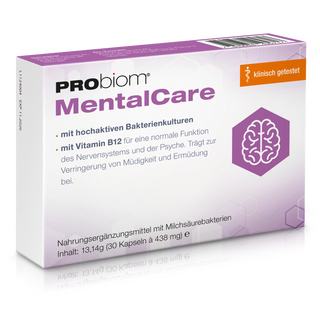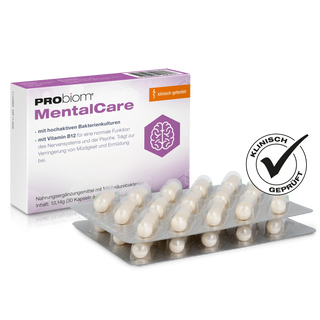In times of increasing psychological stress, many people are looking for natural ways to strengthen their emotional balance. A crucial, yet often underestimated, factor is nutrition. The influence of food on the brain, hormone regulation, and emotional well-being is now well-documented scientifically. In this article, you'll learn how certain nutrients influence gut health and the so-called gut-brain axis—with practical recommendations, well-founded studies, and a summary table for a quick overview.
The role of nutrition in mental health
Our modern lifestyle brings with it many challenges: pressure to perform, constant availability, and an often unbalanced diet. While exercise and psychological support have long been recognized as key pillars of mental well-being, another component is becoming increasingly important: nutrition.
We've long known that the way we eat affects not only our body weight and physical health, but also our mood, concentration, and resilience. A growing body of scientific research shows that certain nutrients, food groups, and eating habits are directly linked to the risk of depression, anxiety, or cognitive disorders.
The brain is an energy-intensive organ: Although it only accounts for about 2% of body weight, it consumes approximately 20% of the daily energy intake. To function optimally, it depends on a constant supply of nutrients.
Essential amino acids such as tryptophan, the precursor molecule of the "happy hormone" serotonin, must be ingested through food. Likewise, vitamins (especially B vitamins), minerals (e.g., magnesium and zinc), and polyunsaturated fatty acids (such as omega-3) are crucial for the regulation of neurotransmitters that significantly influence our thinking and feelings.
A lack of these building blocks can negatively impact mood, reduce stress tolerance, and contribute to long-term mental health problems. Conversely, studies show that a nutrient-rich, balanced diet is associated with a lower risk of depression and anxiety.
The influence of the intestine on the psyche
One of the most exciting developments in nutritional medicine in recent years has been the discovery of the gut-brain axis. This describes the bidirectional communication between our digestive system and the central nervous system. At the heart of this connection is the vagus nerve, which extends from the brain to the gut and transmits both motor and sensory signals.
But communication goes far beyond simple nerve impulses: The gut is directly connected to the brain via hormones, immune cells, neurotransmitters, and metabolic products of intestinal bacteria. Around 90% of the serotonin produced in the body is synthesized in the gut—a crucial indicator of how central the enteric nervous system (often referred to as the "gut brain") is to our emotional world.
A healthy gut flora—that is, the composition of the microorganisms living there—plays a key role in this context. When the microbiome is balanced, it supports the production of anti-inflammatory messengers, strengthens the intestinal barrier, and promotes a stable mood. However, if the microbiome becomes unbalanced (for example, due to poor diet, antibiotics, or stress), this can lead to so-called "leaky gut" phenomena: Pollutants enter the bloodstream, trigger silent inflammation, and, via the gut-brain axis, also impair mental well-being.
Probiotics and prebiotic fiber are therefore becoming increasingly important in the treatment and prevention of mental health issues. Clinical studies show that certain probiotic strains—such as Lactobacillus helveticus Rosell-52 or Bifidobacterium longum Rosell-175—can reduce anxiety and improve mood, presumably by stabilizing the microbiome and the communication pathways between the gut and brain.
Inflammation and its effects on mental health
Chronic silent inflammation is now considered a contributing factor to numerous diseases – including depression. Inflammatory processes often arise from an unbalanced diet with excessive saturated fats, trans fats, and sugar. These lead to biochemical activation of the immune system, which releases pro-inflammatory cytokines.
These cytokines not only influence the body's immune system, but also act in the brain: They can disrupt the production of neurotransmitters, activate stress axes and promote depressive symptoms.
A diet rich in natural antioxidants (e.g., from berries, green leafy vegetables, turmeric), polyunsaturated fatty acids, and anti-inflammatory plant compounds can counteract this process. Adequate intake of zinc, selenium, and vitamin D is also crucial for immune regulation and thus indirectly for mental balance.
Practical tips for a nutrition-conscious mind
The path to better mental well-being through nutrition doesn't have to be complicated. Rather, it's about establishing healthier habits step by step:
-
Include fatty fish (e.g. salmon, mackerel) once or twice a week
-
Focus on fiber-rich foods such as legumes, whole grain products and vegetables
-
Reduce highly processed foods, especially those high in sugar and trans fat
-
Drink enough water – dehydration can also negatively affect your mood
-
Maintain a regular, balanced meal structure without large blood sugar spikes
Summary table: Nutrition and mental health
| Nutritional factor | Effect on the psyche |
|---|---|
| Omega-3 fatty acids | Support the formation of serotonin, have an anti-inflammatory effect |
| Fiber and prebiotics | Promote a healthy microbiome, regulate the gut-brain axis |
| Probiotics (e.g. Rosell strains) | Reduce anxiety and stress, stabilize emotional balance |
| Antioxidants (berries, vegetables) | Protect against oxidative stress, reduce inflammation |
| B vitamins, magnesium, zinc | Essential for nerve function, cognitive performance and stress tolerance |
| Reduced sugar consumption | Avoids blood sugar fluctuations and associated low moods |
| Fluid and electrolytes | Support brain performance and concentration |
Conclusion
Nutrition plays a crucial role in our mental well-being. From providing essential nutrients to regulating inflammation to influencing the microbiome through the gut-brain axis: what we eat every day influences how we think, feel, and act to a far greater extent than was long assumed.
Anyone who wants to be mentally stable, stress-resistant, and emotionally balanced cannot avoid a conscious diet. This doesn't require radical diets, but rather the targeted promotion of nutrient-rich foods, the avoidance of processed foods, and a mindful approach to one's own body.













